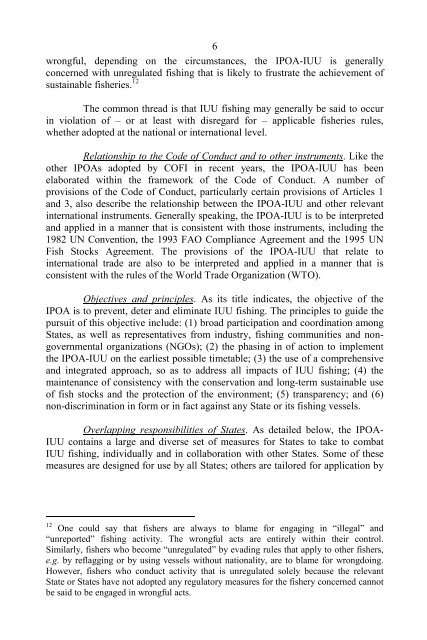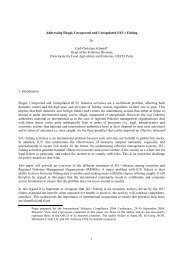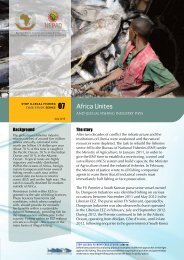Implementation of IPOA/IUU - International MCS Network
Implementation of IPOA/IUU - International MCS Network
Implementation of IPOA/IUU - International MCS Network
You also want an ePaper? Increase the reach of your titles
YUMPU automatically turns print PDFs into web optimized ePapers that Google loves.
6wrongful, depending on the circumstances, the <strong>IPOA</strong>-<strong>IUU</strong> is generallyconcerned with unregulated fishing that is likely to frustrate the achievement <strong>of</strong>sustainable fisheries. 12The common thread is that <strong>IUU</strong> fishing may generally be said to occurin violation <strong>of</strong> – or at least with disregard for – applicable fisheries rules,whether adopted at the national or international level.Relationship to the Code <strong>of</strong> Conduct and to other instruments. Like theother <strong>IPOA</strong>s adopted by COFI in recent years, the <strong>IPOA</strong>-<strong>IUU</strong> has beenelaborated within the framework <strong>of</strong> the Code <strong>of</strong> Conduct. A number <strong>of</strong>provisions <strong>of</strong> the Code <strong>of</strong> Conduct, particularly certain provisions <strong>of</strong> Articles 1and 3, also describe the relationship between the <strong>IPOA</strong>-<strong>IUU</strong> and other relevantinternational instruments. Generally speaking, the <strong>IPOA</strong>-<strong>IUU</strong> is to be interpretedand applied in a manner that is consistent with those instruments, including the1982 UN Convention, the 1993 FAO Compliance Agreement and the 1995 UNFish Stocks Agreement. The provisions <strong>of</strong> the <strong>IPOA</strong>-<strong>IUU</strong> that relate tointernational trade are also to be interpreted and applied in a manner that isconsistent with the rules <strong>of</strong> the World Trade Organization (WTO).Objectives and principles. As its title indicates, the objective <strong>of</strong> the<strong>IPOA</strong> is to prevent, deter and eliminate <strong>IUU</strong> fishing. The principles to guide thepursuit <strong>of</strong> this objective include: (1) broad participation and coordination amongStates, as well as representatives from industry, fishing communities and nongovernmentalorganizations (NGOs); (2) the phasing in <strong>of</strong> action to implementthe <strong>IPOA</strong>-<strong>IUU</strong> on the earliest possible timetable; (3) the use <strong>of</strong> a comprehensiveand integrated approach, so as to address all impacts <strong>of</strong> <strong>IUU</strong> fishing; (4) themaintenance <strong>of</strong> consistency with the conservation and long-term sustainable use<strong>of</strong> fish stocks and the protection <strong>of</strong> the environment; (5) transparency; and (6)non-discrimination in form or in fact against any State or its fishing vessels.Overlapping responsibilities <strong>of</strong> States. As detailed below, the <strong>IPOA</strong>-<strong>IUU</strong> contains a large and diverse set <strong>of</strong> measures for States to take to combat<strong>IUU</strong> fishing, individually and in collaboration with other States. Some <strong>of</strong> thesemeasures are designed for use by all States; others are tailored for application by12 One could say that fishers are always to blame for engaging in “illegal” and“unreported” fishing activity. The wrongful acts are entirely within their control.Similarly, fishers who become “unregulated” by evading rules that apply to other fishers,e.g. by reflagging or by using vessels without nationality, are to blame for wrongdoing.However, fishers who conduct activity that is unregulated solely because the relevantState or States have not adopted any regulatory measures for the fishery concerned cannotbe said to be engaged in wrongful acts.
















